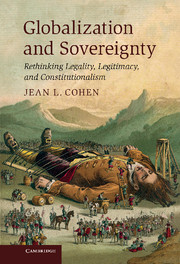Book contents
- Frontmatter
- Contents
- Preface
- Introduction
- 1 Sovereignty in the context of globalization: a constitutional pluralist approach
- 2 Constitutionalism and political form: rethinking federation
- 3 International human rights, sovereignty, and global governance: toward a new political conception
- 4 Sovereignty and human rights in “post-conflict” constitution-making: toward a jus post bellum for “interim occupations”
- 5 Security Council activism in the “war on terror”: legality and legitimacy reconsidered
- Conclusion
- Notes
- Bibliography
- Index
5 - Security Council activism in the “war on terror”: legality and legitimacy reconsidered
Published online by Cambridge University Press: 05 August 2012
- Frontmatter
- Contents
- Preface
- Introduction
- 1 Sovereignty in the context of globalization: a constitutional pluralist approach
- 2 Constitutionalism and political form: rethinking federation
- 3 International human rights, sovereignty, and global governance: toward a new political conception
- 4 Sovereignty and human rights in “post-conflict” constitution-making: toward a jus post bellum for “interim occupations”
- 5 Security Council activism in the “war on terror”: legality and legitimacy reconsidered
- Conclusion
- Notes
- Bibliography
- Index
Summary
Many analysts after 1989 saw a chance to realize the promise of the UN Charter and the declarations and covenants that banned aggressive war, enunciated the principles of the sovereign equality of states, the self-determination of peoples, and the human rights of all persons. The expansion of global and regional human rights regimes and their invocation by local actors (with the help of “activists beyond borders”) to challenge domestic injustice and develop constitutionalism, democracy, and the rule of law, seemed to indicate that the optimism was not unfounded. References to public international law and international human rights helped empower domestic movements and coalitions of political elites seeking to create constitutional democracy, and to strengthen parliaments, courts, and the rule of law over executives and militaries. Many constitutions made in transitions from dictatorships to democracy refer directly to international human rights law. Ensuring human rights and democracy through domestic constitutionalism and the rule of law was deemed the best way to provide for human security. The international human rights documents and their mention in the Charter constituted an important normative referent for progressive civil society and party political actors. As I indicated in Chapter 3, in this period (the mid-1970s to 1989), reference to international human rights, the idea of a democratic entitlement, invocation of public international law, and participation in multilateral institutions did not threaten the autonomy and sovereign equality of states or the popular sovereignty/self-determination of citizens: on the contrary it helped them institutionalize strong rights-respecting and democracy re-enforcing constitutions.
- Type
- Chapter
- Information
- Globalization and SovereigntyRethinking Legality, Legitimacy, and Constitutionalism, pp. 266 - 319Publisher: Cambridge University PressPrint publication year: 2012



